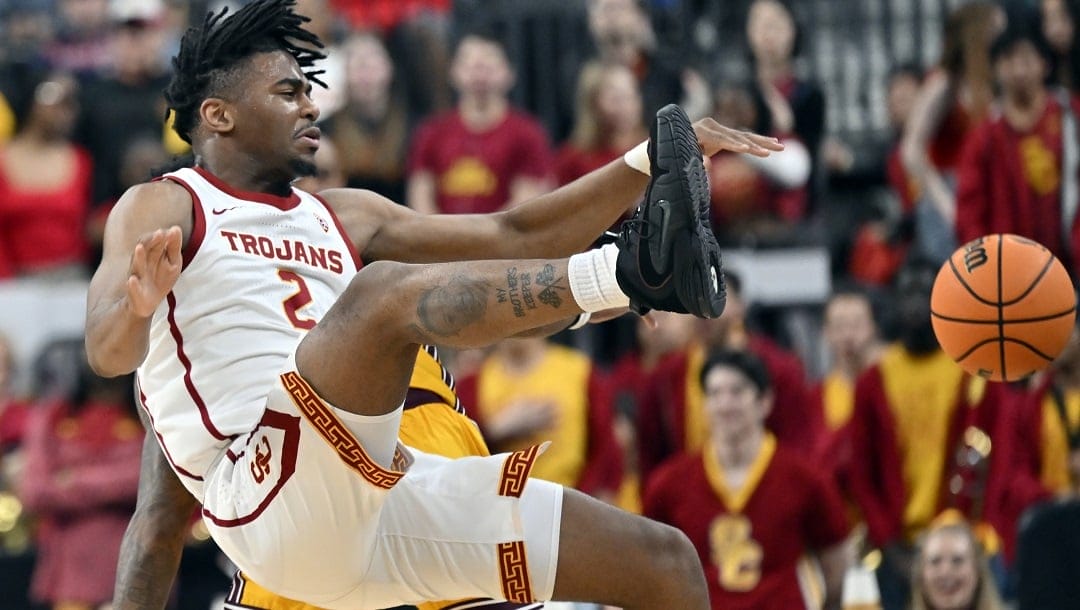Welcome to the college basketball offseason. If you’re new here, this is where we all collectively spend far too much time thinking about the perils and pitfalls of our beloved game.
Normally, I write about college basketball odds. But every once in a while, I like to step back and consider the wider trends of our fair game.
Over the last decade, it can sometimes feel like flopping has become an absolute menace at both the collegiate and professional levels of basketball. Strategic foul collection has gone from an occasional annoyance to an omnipresent plague upon the sport.
In college, less-talented teams strategize around how to remove a dominant opposing player from the court with clever parlor tricks. In the NBA, professionals have been working on new ways to fake fouls with the tenacity of research doctors looking for a cancer cure.
the cultural height of the flop era. https://t.co/X3YEcNZqYh
— Chase Kiddy (@chaseakiddy) May 8, 2023
Everyone seems to know this is a problem. So what are we going to do about it?
Basketball Flop Rule
If you’re looking for the dictionary definition of what is flopping in college basketball, I’ve got that at the ready.
Flopping is “an unsporting act that occurs when a player attempts to influence an official’s judgment by creating an appearance that a foul has been committed when there has been incidental or no contact.”
To really drive the point home, I’ll let Dillon Brooks take it from here:
Basketball Flopping
Flopping increasingly happens at all levels of the sport. But it’s a particularly difficult problem in college basketball, where players are only allowed five fouls. And unlike the NBA, technical fouls also count as personal fouls at the college level.
If you’ve watched a lot of college hoops, then you know that one timely flop can sideline a key player for 10 or 15 minutes of game time. That fundamentally changes the nature of a specific game.
More damningly, it incentivizes players to flop in the first place.
Who Started Flopping In the NBA?
It’s tempting to imagine flopping – especially in the professional game – as a modern menace. You can almost hear the Michael Jordan sycophants arguing.
“Back in the day, hand checking was legal!” they would scream. “Basketball players were tough! None of this flopping, like LeBron does now!”
After Darvin Ham said “we don’t teach flopping” Lebron and Jokic literally had a “flop off” mid game that resulted in a tie.
Basketball is cooked pic.twitter.com/YxfImMarJK
— #1 ranked snitch ref (@DevInTheLab) May 19, 2023
That’s a pretty dream. Unfortunately, it’s total nonsense. Flopping is just as old as the NBA, if not older, and there have been practiced users in every generation. Jason Concepcion wrote an excellent historical flopping outline back in the Grantland days of yore. (RIP)
The true smoking gun was a Sports Illustrated article, written by Celtics veteran Frank Ramsey in December 1963. In it, he shamelessly outlines all the ways he uses flopping to his advantage on the court.
Ramsey’s article can be summed up by one of his first sentences: “Particularly on defense, when everything else fails, I fall down.”
Flopping casts a long historical shadow, indeed.
The Fix For Flopping
The NCAA knows that flopping is a problem. It tried to outlaw the practice on the men’s side prior to the 2022-23 season, then followed up with a similar rule change on the women’s side for 2023-24.
The rule outlaws flopping by penalizing it. Players who are deemed to have flopped are given a warning. If they flop again, it’s a technical foul.
While I appreciate the NCAA’s action on this, the fix ultimately relies on referees’ ability and willingness to recognize and call these flopping penalties in real time. That’s a high burden to clear for an increasingly systemic problem. I suspect the rule’s effectiveness will be negligible.
So instead of instituting a penalty for flopping, I’m recommending a different approach. What if the sport removed some of the incentive for flopping?
I would fix flopping by raising the number of fouls a player can receive before being disqualified. This greatly reduces the effectiveness of targeting specific players for fouls via flopping. As an added bonus, it also deemphasizes the importance of a badly-called block/charge foul.
The charity stripe is still in play, but college players would no longer be in danger of disqualification based on bad-luck calls and bad-faith flops.
Soft foul on Edey.
Mulcahy should have got tech for that flop.
— John Ewing (@johnewing) March 10, 2023
When I ran this by a few basketball fans in my life, I sometimes got some pushback on the allegedly radical nature of the idea. It went something like this: “But Chase, we can’t just change the number of fouls a player is allowed!”
My rebuttal: why not?
Seriously. Why not? Was the five-foul limit a preordained, sacramental belief from the bosom of James Naismith himself?
It’s not like we don’t make rule changes – sometimes, even drastic rule changes. College basketball implemented the restricted area underneath the basket prior to the 2010-11 area, and it has clarified at least some of the block/charge confusion that happened underneath of the basket.
College basketball also added an entirely new kind of shot – the three-pointer – in the 1980s.
No other sport that I’m aware of disqualifies players for foul volume. Plenty of sports (including basketball) make ejections for egregious fouls, like targeting in college football or red cards in soccer or lacrosse. Basketball is the only team sport where mere common fouls can lead to a player’s removal from the game.
Shouldn’t the bar for disqualification be a little bit higher?
Flopping has hijacked that process for easy free throws and competitive advantage. By changing the number of fouls allowed, we can fundamentally alter the reward calculus for floppers.
That, in conjunction with new punitive rule changes, could start to unwind the culture of flopping.
Related Articles
Basketball Odds at BetMGM
BetMGM is the premier destination for updated basketball odds.
From in-season college basketball betting on spreads, moneylines, or parlays, to offseason NBA futures like NBA championship odds or NBA MVP odds, there are a variety of markets for everyone regardless of basketball expertise or sports betting experience.
Visit the online sportsbook today to place a bet online!
If you don’t have an account, sign up for the BetMGM welcome bonus, one of many sportsbook offers at BetMGM.










